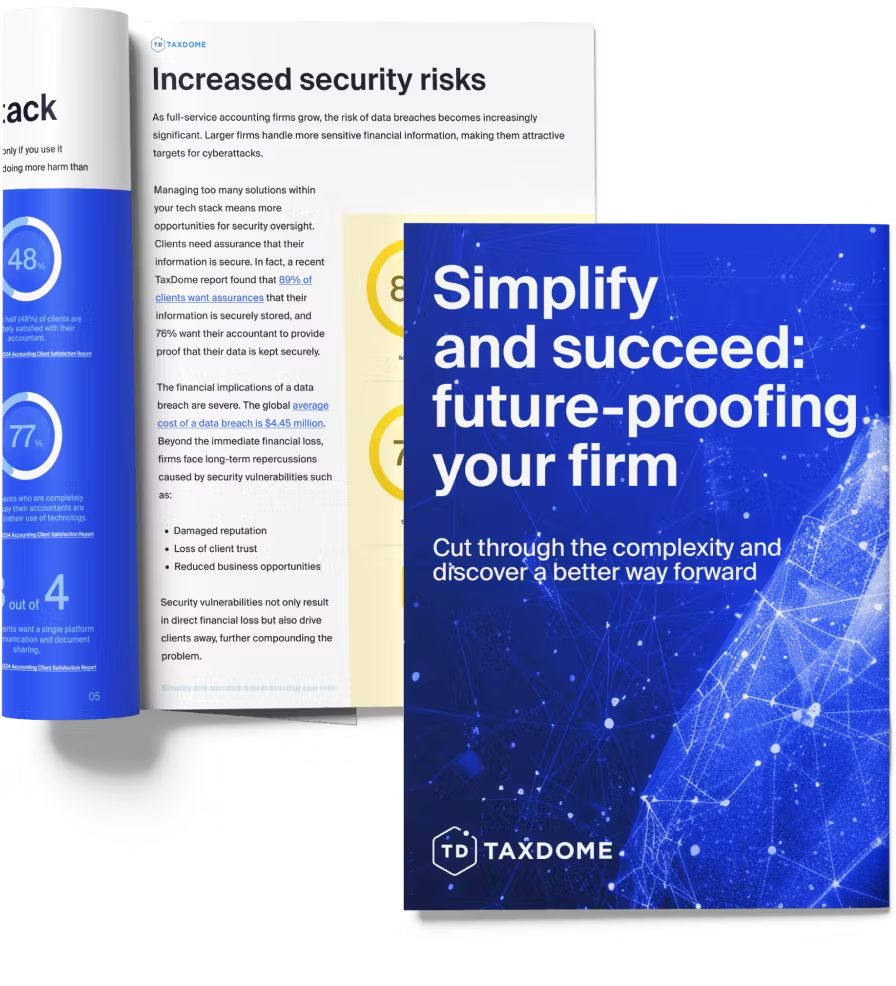
In recent years, artificial intelligence (AI) has gone from a futuristic concept to an everyday tool. From large-language models like ChatGPT to AI-infused accounting software, this groundbreaking technology is rethinking the way accountants approach their work.
The speed of AI adoption has caught many people off guard. So has the rate of its advancement. This has left many accountants with a nagging question: will AI replace accountants altogether?
In this article, we’ll answer that question for you by looking at what leading accounting firms have to say. We’ll also explore the scope and limits of AI’s potential, and what that means for human accountants.
Is AI here to replace accountants: the Big Four’s opinion
The Big Four accounting firms have been at the forefront of AI adoption in recent years. Each firm has invested serious resources into developing proprietary AI models and exploring groundbreaking use cases. So who better to go to for an assessment of AI’s potential?
To cut a long story short, the Big Four’s verdict is this: AI is not here to replace accountants. It’s here to augment them.
For the time being, AI can’t perform the same functions that a human accountant can. “It won’t replace the human at the human-to-human interaction level,” Cliff Justice, KPMG’s enterprise innovation leader, explained last year. “It doesn’t ideate, it doesn’t create innovations by itself. That may come in the future,” he continued.
These thoughts are echoed by EY’s Paul Goodhew, who believes human judgment cannot currently be replaced. “We recognize it will be essential for the human to always be there to provide the deep judgment,” he explained. “Ultimately, the AI might help them get answers, but human judgment is essential.”
Deloitte’s Chris Griffin sees AI’s capabilities in the same light. In his opinion, soft skills such as good judgment and skepticism remain distinctly human. “Our talent is our most important asset, and this doesn’t change that,” he explained.
“You still need that judgment, that skepticism, to deal with things like bias and reliability. Those kinds of issues are core to what we do.”
Griffin’s colleague at Deloitte, Will Bible, pressed this point further. He explained that audit by its very nature requires human input. “Right now, a machine cannot take responsibility for an audit opinion. It requires a person. From the conceptual level, an audit product, at its most fundamental nature, must have a person involved who is an experienced qualified professional,” he said.
Tasks AI can effectively replace in accounting
AI has a remarkably broad scope of application. It takes simple accounting automation a step further by mirroring human cognition — at least to some extent. This means AI can handle everything from basic rules-based calculations to more “creative” outputs.
What’s more, AI can learn and improve over time. Machine learning (ML) algorithms can be trained on huge data sets. They can fine-tune their models as more data is fed into them, or based on feedback or outcomes.
What really sets AI apart is its speed and scalability. Where humans can only perform one calculation at a time, AI can perform multiple virtually instantly.
Below, we’ll look at some of the accounting tasks that you can currently hand over to AI or robots:
- Repetitive computational tasks. AI can handle calculations at a speed and scale far beyond human capabilities. Using AI, you can save serious time on tasks such as tax computations, payroll processing, and invoice reconciliation.
- Data processing and reporting. Automation tools can quickly process large datasets and generate detailed financial reports. This saves you significant time while improving the accuracy and completeness of your reporting process.
- Transaction categorization. AI-powered accounting software can automatically classify transactions based on historical patterns and predefined rules. Human input is still required to define the rules and verify accuracy, but automating this process is a huge time-saver.
- Fraud detection and audit. Advanced AI algorithms can scan huge amounts of financial data in an instant. They can identify inconsistencies that point to potential fraud or compliance issues. Freed from this time-consuming manual work, accountants can focus on proactively addressing the issues the AI flags.
- Expense management. AI can scan receipts and auto-categorize expenses. It can also analyze spending patterns, flag unusual expenses, and provide predictive insights for budget adjustments.
- Marketing and client communications. Accountants can use tools like ChatGPT to quickly draft email templates, create marketing strategies, and repurpose content for different formats.
All of these use cases reduce the need for manual involvement in routine tasks. At the same time, they create opportunities for accountants to pivot towards more high-value work that AI cannot replicate.
For a more detailed look at how AI is transforming the accounting industry, check out this article: AI in accounting 2024: key trends, technologies, and how to get started.
Critical human skills AI cannot replicate
AI falls short when it comes to replicating the uniquely human skills that are indispensable in accounting and financial management. Often known as “soft skills”, these skills go beyond knowledge and technical expertise. They involve distinctly human capabilities such as emotional intelligence, ethical judgement, and people skills.
Such skills will continue to remain invaluable despite the rise of AI and automation. If anything, they’ll become even more valuable than before. Let’s look at some key examples:
- Strategic financial interpretation. Accountants bring a deep understanding of financial trends and business goals. This enables them to interpret data strategically and offer tailored advice that aligns with a company’s objectives.
- Complex problem-solving. Navigating intricate financial challenges requires creativity and nuance. Accountants can evaluate multiple scenarios and foresee different outcomes. This requires a level of flexibility and understanding that AI cannot replicate.
- Ethical decision-making. Accountants are often faced with ethical dilemmas. In such situations, context, judgment, and professional integrity are essential. AI operates on predefined rules and lacks the moral compass needed to understand ethical considerations.
- Client relationship management. Building trust and rapport with clients is a human skill. It involves active listening, empathy, and clear communication. These are all qualities AI lacks.
- Contextual understanding of business environments. Accountants possess a nuanced understanding of industries, markets, and organizational cultures. This enables them to adapt strategies to fit specific contexts. AI cannot fully grasp the subtleties of these dynamics.
- Emotional intelligence in financial consulting. Accountants rely on emotional intelligence to provide support and maintain positive relationships. They also rely on empathy to deeply understand client needs and goals. AI cannot empathize in this way.
The above skills demonstrate why accountants remain irreplaceable. By leveraging these human strengths, accountants can complement AI capabilities to provide the best of both worlds.
The role and future of accountants in the era of AI
The impact and scope of AI has increased massively in recent years. Yet in terms of potential, we are still only scratching the surface of what AI could become. In the coming years, we could see AI tools routinely used for new use cases, including:
- Conducting real-time financial audits
- Delivering predictive analytics for proactive decision-making
- Ensuring seamless compliance with rapidly changing regulations
- Acting as personal assistants to accountants
- Providing direct support to clients through personalized services and communication
At this point, you might be wondering where this is all heading. If AI’s adoption and capabilities are set to grow exponentially, what role do accountants have to play in the future? At TaxDome, we believe accountants and AI will work synergistically. Each will complement the other. This will enable accounting firms to realize new levels of efficiency, accuracy, and client service.
With AI doing much of the repetitive heavy lifting, accountants will likely take on more strategic roles. Their work will focus more on consulting, risk management, and advisory services.
Liberated from mundane tasks, accountants will play a more direct role in driving organizational growth. They will also be required to provide oversight of the AI’s work. Whether it’s in audit, fraud detection, or tax planning, a human will always have the final say.
To thrive in the AI era, accountants must focus more on the soft skills that differentiate them from AI. Competencies such as strategic financial analysis, communication, adaptability, and leadership will be in high demand.
To reiterate what the Big Four experts have said, the future of the industry is not about replacing accountants. It’s about augmenting them. By embracing AI as a partner rather than a competitor, accountants can unleash their human potential.
Leveraging software for accounting automation
When it comes to adopting AI in your day-to-day accounting jobs, you don’t have to look far. Most accounting, tax, and bookkeeping software has AI-infused features. Such features are becoming less of a novelty and more of an expectation.
Here at TaxDome, we’ve been quick to leverage the power of AI in our award-winning practice management platform. Take our reporting and analytics tool, for example. In addition to providing you with real-time insights into team and firm performance, you can use our AI-powered search bar to quickly find the data points you need.

Simply type in a query — such as “most valuable client per service line” — and our AI will quickly deliver the insights and data visualizations you need. But that’s not all. We’ll soon be releasing TaxDome AI to automatically organize and name client documents for you. Stay tuned for more updates!
To sum up
The rise of AI in accounting brings both opportunities and challenges. AI is transforming how firms manage data, automate accounting workflows, and detect errors. With this in mind, could a CPA be replaced by AI in the near future? The short answer is no. AI cannot replace the nuanced judgment, strategic thinking, and interpersonal skills that define the profession.
Instead of viewing AI as a replacement, accountants should see it as a tool to enhance their roles. As AI becomes increasingly adopted, accountants will naturally shift their focus away from repetitive tasks and towards more strategic, high-value ones.
Looking for a practical way to use AI in your firm? With AI-powered reporting and workflow automation, TaxDome helps accountants elevate their practice and drive results.
To see TaxDome in action, request a demo today.

Thank you! The eBook has been sent to your email. Enjoy your copy.
There was an error processing your request. Please try again later.
What makes the best accounting firms thrive while others struggle to keep up? We analyzed our top 20 TaxDome firms, representing over $100M in combined revenue, to uncover the strategies driving their success.



